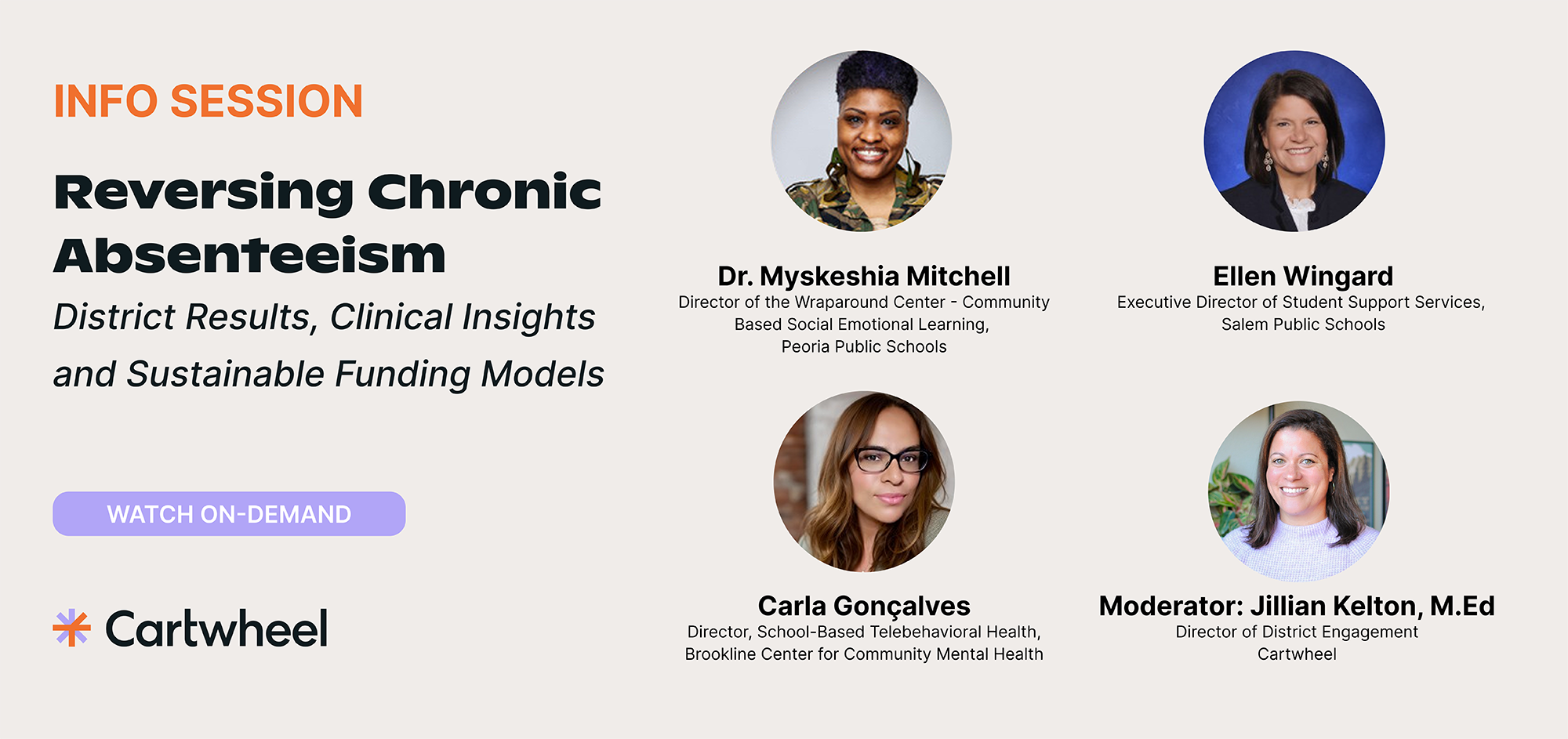In Cartwheel’s first webinar of the 2025-26 school year, Cartwheel’s Chief Medical Officer, Dr. Juliana Chen, welcomed Dr. Christine Crawford—a psychiatrist, author, and leader at the National Alliance on Mental Illness (NAMI). Dr. Crawford shared helpful, everyday ways parents and caregivers can support kids and teens through mental health challenges.
Dr. Crawford is the author of You Are Not Alone: The NAMI Guide to Navigating Your Child’s Mental Health, a resource for parents and caregivers looking for guidance and support.
By the Numbers: How Mental Illness Affects Youth
Dr. Crawford explained that kids and teens are struggling more than many people realize:
- Half of all mental health issues start by age 14
- 1 in 6 teens have experienced a major depressive episode
- More than 6 million kids have ADHD
- More than 4 million kids have anxiety
- Suicide is the second leading cause of death for kids ages 14–18
She reminded families that while COVID made these challenges worse, the problem existed long before—the pandemic just made more people notice.
Another striking number: on average, it takes 11 years from the time symptoms begin to when treatment starts. Families often don’t recognize the signs or know where to turn for help. “Kids don’t have that kind of time,” Dr. Crawford said.
And because there aren’t enough mental health providers in many states, she encouraged parents, teachers, and caregivers to learn simple tools and strategies to support kids’ mental health.
The Stress of Seeing Trauma Everywhere
Dr. Crawford noted that years ago, you’d have to tune into the evening news to find out what was happening around the world. Today, it’s right on our phones — 24/7.
This constant exposure can cause what’s called vicarious trauma—when hearing about or seeing someone else’s trauma affects your own sense of safety and well-being.
It might be from watching violent scenes on TV or social media, hearing something in the news, or listening to a friend share a traumatic experience.
She said parents should look for signs like:
- Scrolling endlessly through bad news (“doom scrolling”)
- Withdrawing from friends and family
- Feeling fearful, angry, or unmotivated
- Sleeping challenges
Not everyone is going to be profoundly affected in this way, Dr. Crawford shared, but those who do need to have their experiences validated. “If a kid is stressed out, that's all that matters. We need to attend to that child and provide them with support, rather than saying, ‘oh, you shouldn't have to worry about that, that's not that big of a deal.’ ”
Help Kids Feel Safe and Grounded
Dr. Crawford explained that kids’ brains are still developing. Their “logic center” isn’t fully grown yet, but their “fear center” is strong. That’s why stress can hit them especially hard.
Her advice: practice co-regulation—helping kids manage emotions by modeling calm behavior and keeping a steady routine.
“Kids are doing the best they can with the brains they have,” she said. She encouraged parents to:
- Keep routines and boundaries consistent
- Show kids how you handle stress, since they watch and learn from you
- Stay tuned in to your child’s feelings, even on busy days
Know What Their Scrolling
“Teenagers live on social media,” Dr. Crawford said. While we can’t take it away, we can be more present with them.
She warned that nearly 84% of mental health advice on TikTok is misleading. That’s why kids need to hear from parents and trusted adults, not just peers online.
Her tip: “Sit next to your child while they scroll. You can learn a lot about what’s on their mind by looking at their ‘For You’ page,” because that's a reflection of the things they're thinking about or searching for.
Dr. Crawford emphasized that being present, even in small moments, helps parents better understand their child’s world. With so much misinformation out there—especially about mental health—it’s important to trust your instincts, stay curious, and focus on truly getting to know your kid.
‘Look, Listen and Lock In’
Parents often ask how to know if their child is really struggling. Dr. Crawford shared a simple framework:
Look – Notice changes in behavior. If irritability, withdrawal, or acting out shows up in multiple places (home, school, sports), it may signal something deeper.
Listen – Start conversations, and focus on listening instead of fixing. “Simply showing your child you’ve noticed a change tells them someone cares,” she said.
Lock In – Reassure your child by saying something like, “I’m here to support you. I’m not going anywhere. We’ll figure this out together.” Dr. Crawford explained that consistency builds trust and helps kids feel less alone.
As Dr. Crawford reminded us, kids are dealing with a lot—from mental health challenges to the constant stream of stressful news and social media. But parents and caregivers can make a huge difference by:
- Paying attention to changes in behavior
- Listening more than lecturing
- Keeping routines steady
- Being curious about their world (including social media)
- Reminding them they’re never alone
Raise your hand for support: Oftentimes, families are the first to recognize that their child may need mental health support and we’re here to help. You can now raise your hand directly for mental health support with Cartwheel. Learn more.
Want more content like this? We have more valuable webinars planned throughout the year. View our complete webinar calendar and register for upcoming sessions: View Calendar.



.png)
.png)
